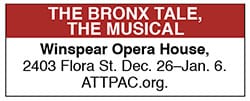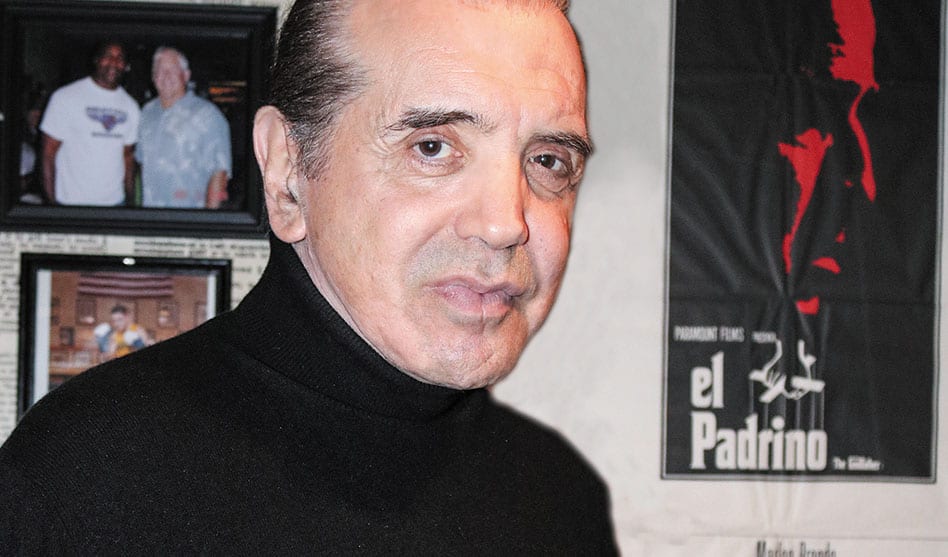Chazz Palminteri dined at Campisi’s in front of a poster for ‘The Godfather’ when in Dallas promoting ‘A Bronx Tale.’ (Arnold Wayne Jones/Dallas Voice)
Chazz Palminteri revisiting ‘A Bronx Tale’ in musical form? Fugedaboutit!
 It’s kinda hard to believe, but there was a time when nobody knew who Chazz Palminteri was. I know, seems impossible. After all, the craggy-faced, gravel-voiced Noo Yawkuh is such an avatar of the gruff Italian kid “from the neighba’hood” that he could have existed in a scene from a Cagney film from the 1930s.
It’s kinda hard to believe, but there was a time when nobody knew who Chazz Palminteri was. I know, seems impossible. After all, the craggy-faced, gravel-voiced Noo Yawkuh is such an avatar of the gruff Italian kid “from the neighba’hood” that he could have existed in a scene from a Cagney film from the 1930s.
But in fact, it was less than 30 years ago that the broke boxer, singer and doorman sat down with a pen and legal pad and conjured up A Bronx Tale, a one-man show which he also starred in Off-Broadway, then became a movie and launched his career. It was no time before Palminteri was an in-demand character actor, receiving an Oscar nomination for Woody Allen’s Bullets Over Broadway and cementing his persona in the Zeitgeist.
Then last year, Palminteri revisited his play and movie, writing the script for a musical (with a score by eight-time Oscar-winning composer Alan Menken and lyricist Glenn Slater) based on A Bronx Tale, which ended up being a surprise hit. Like Jersey Boys before it, it humanizes the goombah culture in an allegory — based on Palminteri’s own childhood — about youth and redemption.
A Bronx Tale, the Musical opens at the Winspear the day after Christmas, but Palminteri came to Dallas ahead of time to talk about his life, the show and the handshake deal that made him a star.
— Arnold Wayne Jones
Dallas Voice: What was it like changing your life story into all these different art forms? Chazz Palminteri: It was a one-man show first, then it was a feature film, and now it’s a Broadway musical, and each one is very different. I mean, you just can’t [take the] movie and add songs to it, or have a one-man show and add music. That’s what makes it unique.
You had never written a play before — what gave you the thought you could do it? I was a great storyteller — I used to tell stories on the corner. I had the soul of an artist. I was very good in English [class] though I wasn’t a good student even when I went to college. I dunno. But it worked out OK.
How did you get the idea to write the play? I ran out of money and was desperate. I used to box and worked as a doorman at a nightclub. This one guy tried to get in and I wouldn’t let him in. Turns out he was Swifty Lazar, the biggest agent in the world [at that time]. He said, “You’ll be fired in 15 minutes.” I was like yeah, yeah… My boss come out, said hi Swifty … and I was fired in 15 minutes. He was nasty to me.
I went home and sat on the edge of my bed. Looked at the card on the refrigerator [where I had written what my father said about wasted talent] and thought, well, if they wont give me a part I’ll write it myself. So I went to Thrifty Drug Store, bought five tablets of paper and said, What will I write about? I decided to write about the killing that I saw when I was a kid and my relationship with the wise guys and my father. I started to write, and in 10 months I had a 90-minute, one-man show.
It was your first big hit — how did you get people to support it with you as a writer and star? So I borrowed money from a friend — a legitimate friend, may I say — and I put it up and BAM! My life exploded. I won all these awards, and all of a sudden I got offered $250,000 [by a film producer] the week after it opened; I had $200 in the bank. I said, “Great, but I want to play Sonny and I want to write the screenplay.” He said, “No you can’t — we want to get a star and want someone else to write it” and I said [well, let’s just say “fugedaboutit].
So they waited two weeks to freeze me out and offered me $500,000 .. again I said, “I play Sonny and write the screenplay,” and again they said it’s not gonna happen. Everyone said I was crazy — the last time this had happened was Sylvester Stallone. But I kept doing the show, and the lines got longer — everyone was coming to see it. Nicholson, Pacino … they all wanted to play Sonny. Every director wanted to direct it, and every studio wanted to make it, and it became insane. So they came in one more time and offered me $1 million. They slid a piece of paper over and said, “Sign that check and you’ll get $1 million tomorrow.” I said “OK… but I get to play Sonny, and I get to write the screenplay.” And he said, “Chazz, we need a star in the part.” I said, “But this will make me a star.” And he said they can’t do, it so I said [neither can I]. I stood up to leave, and he said — I still remember his words — “You know this movie will never get made.” And I said, “You’re right… with you.” He said, “How can you be so sure?” And I said, “Because it’s too damn good. Somebody will believe in me sooner or later.”
Crowds kept getting bigger. One day I did the show, and when I got off stage the stage manager said, “Robert De Niro wants to meet you — he’s in your dressing room.” [De Niro] said, “That’s the greatest one-man show I ever saw! This would make a great movie.” I said, “I know, but no one wants me to be in it — they want to put a star in it.” He said, “Well, you should play Sonny, you’d be great, and you should write it because it’s your life, and I’ll play the father and direct it. And if you shake my hand, we’ll go partners.”I shook his hand, and rest is history.
How did you go about adapting it from then to now? I was a lyricist [when I was younger], and I used to sing, but in a musical, the meat of the [action had to be] done in the song — the dialogue is just to set up the song. You can’t have the scene and then say the same thing in the song. It’s a whole different art form.
How has your understanding of the material developed over every incarnation? When I was 9 years old, I saw this guy kill a man right in front of me. The cops came, and I was sitting right there, and they asked me who did it, and I said I didn’t know. I just refused to rat. At 9 I was smart enough to know that. When I first wrote it 30 years ago, I really related as the young boy to the father, because my father was a bus driver who told me, “The saddest thing was wasted talent.” But when I had a son, and he got older, I started relating as the father to the boy.
You wrote the musical, but what is your role with the current tour? My role is what I’m doing right now! I am one of the producers and wrote it, so I am there [in many of the cities where it opens], but because it’s my life story, I can sell it better than anybody. It’s a story I’m very proud of.
What do you see as the message? A Bronx Tale is a cautionary tale about not wasting your talent. Sonny [the gangster/mentor in the show] didn’t want me to be a gangster, he wanted me to go to college, but my father said just because who Sonny is, he will influence who you are just [by] being around someone like that. I was, like “Dad, he’s a great guy,” and I would sneak out and hang out with him. And I was in danger a few times. My father was right.
How has it resonated with audiences outside the Tri-State area? It is a huge hit in Japan — you say, “What? How could that be?” But the characters are like archetypes — symbols as opposed to characters. Everyone can relate to that. It’s about “Is it better to be loved or feared?” The choices you make will shape your life forever. It’s about Machiavelli. Sonny the wise guy used to read Machiavelli. Who ever heard of that? I asked Sonny, “When did you read Machiavelli? You didn’t go to college?” And he said, “Well they sent me away to college a few times,” and I knew what he meant when he said that.













